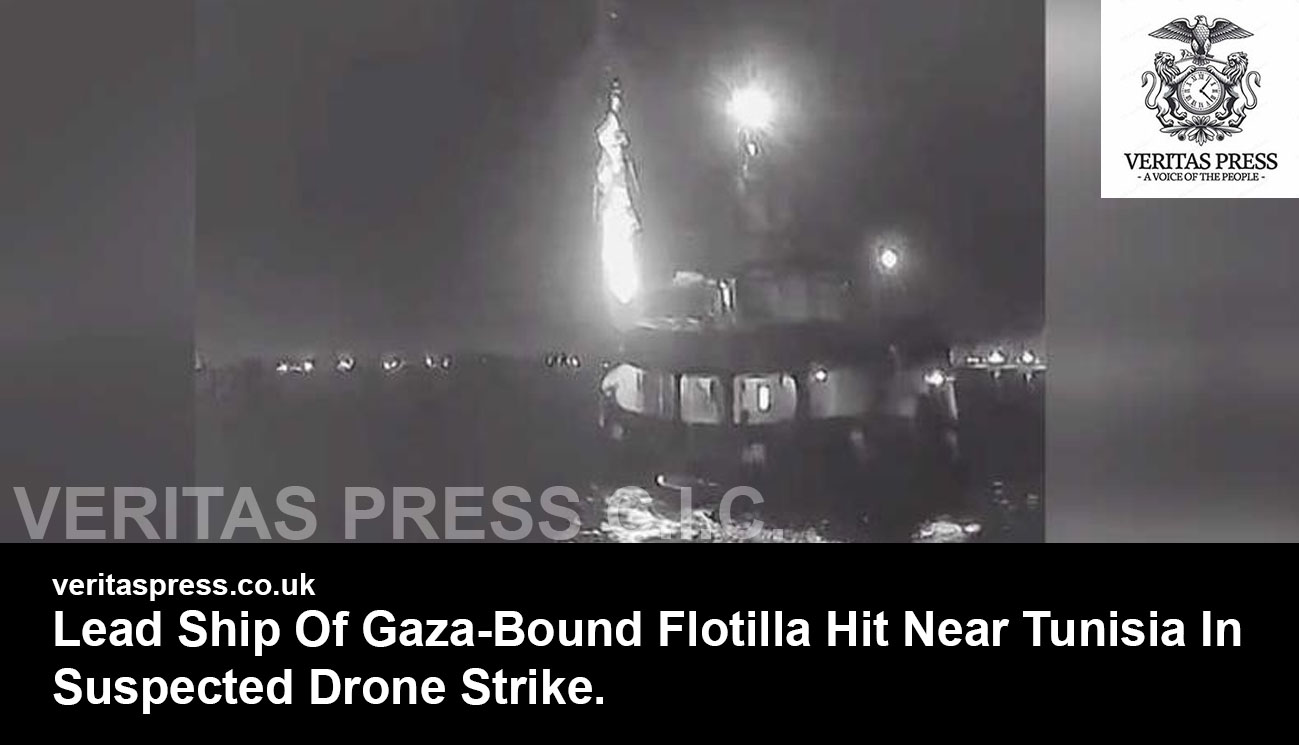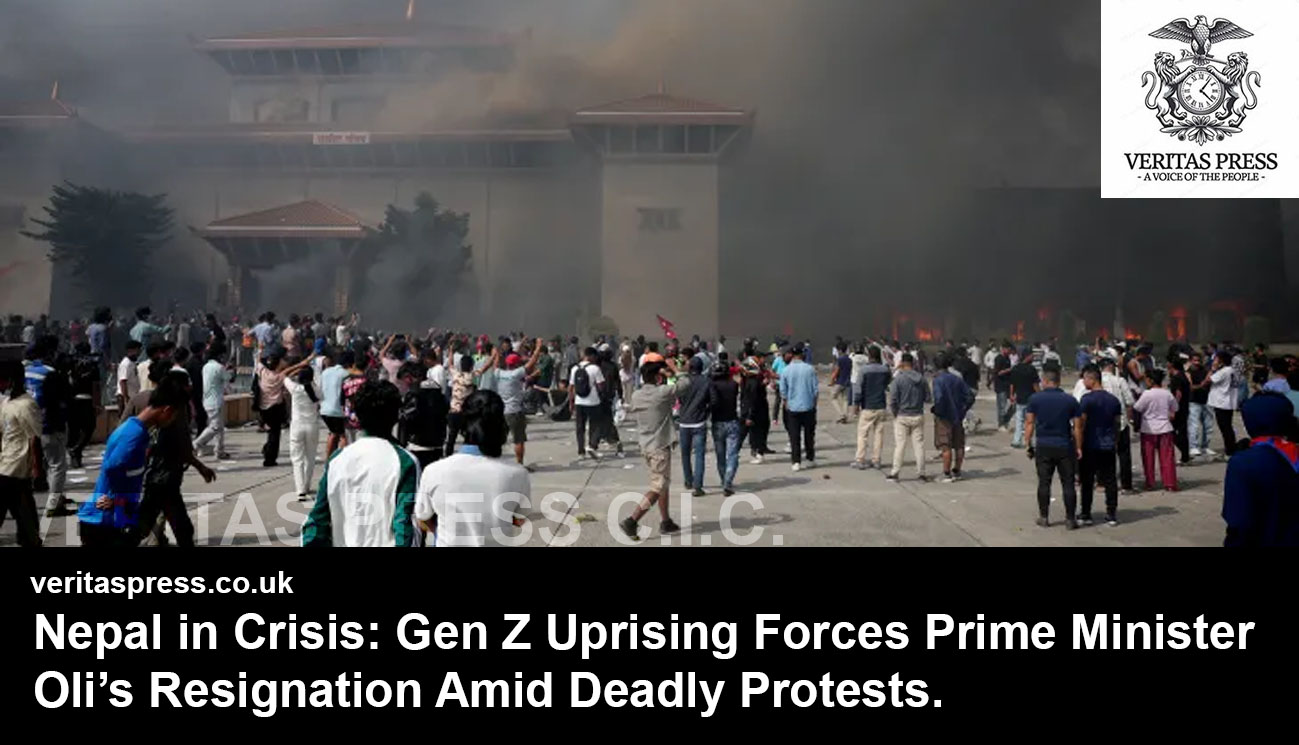Press Release: Veritas Press C.I.C.
Author: Kamran Faqir
Article Date Published: 09 Sept 2025 at 12:15 GMT
Category: Middle East | Palestine-Gaza | US-Israel At War
Source(s): Veritas Press C.I.C. | Multi News Agencies
The Incident:
Early Tuesday, the Global Sumud Flotilla, an international coalition aiming to break Israel’s naval blockade of Gaza, reported that its lead vessel, the “Family Boat”, was struck by what activists allege was an incendiary drone strike near the Tunisian port of Sidi Bou Said. A fire ignited aboard the Portuguese-flagged ship, but fortunately, there were no injuries.
Activists released video footage showing a fiery object plummeting onto the boat and initiating the blaze. The footage was filmed from a nearby flotilla vessel.
Claims and Counterclaims:
- The Global Sumud Flotilla maintains its assertion of a drone attack, with members including Yasemin Acar, Thiago Ávila, and climate activist Greta Thunberg among those present during the incident.
- The group emphasised that the attack would not deter their mission.
In contrast, Tunisian authorities firmly denied any drone involvement. The Interior Ministry characterised the fire as accidental, possibly sparked by a malfunctioning life jacket, cigarette, or lighter, and quickly contained. The National Guard found no evidence of a drone in the area.
UN Special Rapporteur Francesca Albanese, who was present at the port, leaned toward the likelihood of a drone strike and cautioned about threats to other flotilla vessels.
Broader Context & Response:
Support for the flotilla swelled as demonstrators gathered outside the port, waving Palestinian flags and chanting in solidarity.
This flotilla, described as the largest civilian mission of its kind, comprises vessels from 44 countries and includes activists, politicians, doctors, and journalists. On board are notable figures such as Mariana Mortagua, among others. The convoy departed from Barcelona, and others are joining from Tunisia and Sicily, aiming to converge before sailing toward Gaza.
The flotilla’s objective: to confront what they call the “illegal blockade” of Gaza and deliver humanitarian aid amid a growing crisis, exacerbated by famine and thousands of casualties in Gaza.
Legal and Moral Dimensions:
- International law views the naval blockade of Gaza as unlawful when it results in civilian starvation or blocks humanitarian aid, violating the Fourth Geneva Convention, Additional Protocol I, and provisions of the Rome Statute and Genocide Convention.
- The ICJ affirmed that Israel, as an occupying power, must ensure humanitarian provisions to Gaza. The flotilla operates under the rights of high seas navigation and aims to uphold these fundamental principles.
- Participants are committed to non-violence, recalling the Mavi Marmara tragedy in 2010.
What This Reveals:
- The divergent explanations, from drone strike to accidental fire, highlight deep mistrust between activists and official Tunisian sources.
- The flotilla remains resolute in its mission, leveraging global solidarity while challenging international legal norms that have so far failed to enforce a humanitarian corridor to Gaza.
- This event further showcases the bold role of civil society in filling the vacuum left by state inaction.
Summary Table:
| Aspect | Details |
| Incident | Fire on “Family Boat” of Global Sumud Flotilla near Sidi Bou Said |
| Activists’ Claim | Drone strike caused a blaze; video evidence; no injuries. |
| Tunisian Position | Denies drone involvement; blames internal incident; fire contained |
| UN Position | Special Rapporteur leans toward drone explanation. |
| Flotilla Launch | Largest ever, 44 countries, activists, including Greta Thunberg |
| Legal Framework | Blockade and denial of aid violate humanitarian law. |
| Current Status | Flotilla mission continues; investigation ongoing. |
Conclusion: A Test Of Conscience And Accountability.
The alleged drone strike on the lead vessel of the Global Sumud Flotilla is far more than an isolated maritime incident; it is a stark illustration of the escalating impunity surrounding Israel’s blockade of Gaza and the lengths to which state or proxy actors may go to intimidate civil society. While Tunisian authorities have claimed the fire was caused by an internal malfunction, the hallmarks of the attack, precision targeting, timing, and the incendiary nature of the device point less towards accident and far more toward a deliberately orchestrated strike by Israeli proxies. The incident underscores a chilling reality: activists attempting a lawful, non-violent mission to deliver humanitarian aid are operating under the persistent threat of lethal force, while the global mechanisms designed to enforce international law remain inactive.
The flotilla’s challenge is a direct rebuke to the international community’s failure. UN resolutions, ICJ advisory opinions, and the Rome Statute have repeatedly affirmed Gaza’s right to humanitarian relief and condemned collective punishment. Yet Israel’s blockade continues, starving civilians and denying essential aid. By threatening flotilla participants, labelling them “terrorists,” or attempting to disrupt their navigation through covert strikes, Israel exposes the glaring hypocrisy of an international order that enshrines human rights in principle but fails to uphold them in practice.
Civil society, not states, is now assuming the mantle of accountability. The Global Sumud Flotilla, comprising activists, medical personnel, journalists, and observers from 44 countries, embodies the international conscience confronting a protracted humanitarian catastrophe. Its resolve underscores a critical truth: legality and morality cannot remain theoretical when inaction perpetuates starvation, displacement, and violence.
Any aggressive response by Israel, or by its proxies, whether through interception, intimidation, or covert attacks, would further entrench its isolation and amplify global outcry against its siege. Each act of obstruction against the flotilla will serve not as deterrence, but as a galvanising moment, compelling new waves of international action, drawing more eyes, and cementing the legitimacy of civil society’s intervention.
The Global Sumud Flotilla is not merely a humanitarian mission; it is a strategic confrontation with lawlessness and impunity, a test of conscience for the world. Its journey exposes the systemic failure of states to enforce international norms, the vulnerability of civilians under blockade, and the moral imperative for the international community to act decisively before inaction becomes complicity.
Tags:




























Leave a Reply